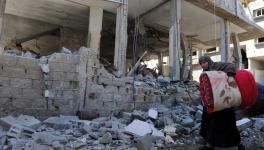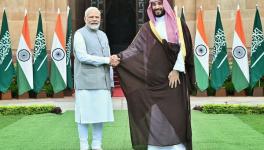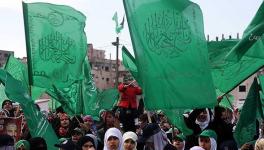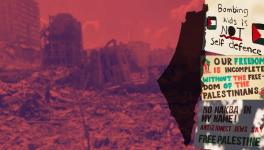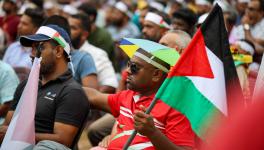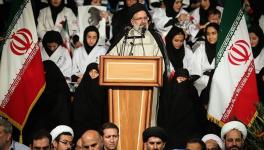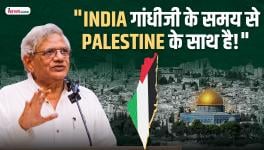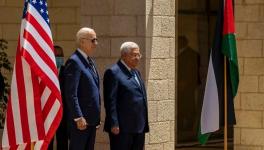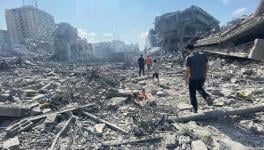Yemen - Saleh using Geopolitics to Clutch on to Power
Vijay Prashad, professor at Trinity College, Hartford, CT, USA comments on the latest developments in Yemen where unpopular ruler Abdullah Saleh has maintained his grip on power through recourse to support from Saudi Arabia. He also comments on US president Barack Obama's latest speech on the Arab Spring and the supposed "differences" between Israel and the United States following the Hamas-Fatah accord.
Rough Transcript
Prabir Purkayastha (PP): The other issue of course in the Middle East today or West Asia is Yemen and over there you seem to have a similar dead lock between what the West would like in terms of regime change having Saleh go peacefully. But it seems to have but he seems to have dug his heels in and he doesn't seem to be planning out.
Vijay Prashad (VP): Well, you see, he has better cards in his hand and the best card that Saleh has in his hand is that Yemen neighbours Saudi Arabia. Last thing that Saudis want is any kind of permanent demonstration that a leader can be kicked out by a popular force. They would be able to make the deal with the Europeans and the Americans to crush the rebellion in Bahrain which has now disappeared from the News. Even though human rights violations in Bahrain continues. So on the one side Saudis do not want demonstration effect of a leader removed by a popular struggle which is why Saleh is able to continue to negotiate the gulf coordinating committee team came to Sana. They sat down at signing ceremony where Saleh was going to sign away you know a pact for his removal and at the very last minute he decided not to ink the document and the gulf coordinating committee had to leave . Well, the reason he could get away with all that is again is that the Saudis do not want to see a possible removal. What they want to see is some kind of mediated transition to remove tension in Yemen. You know, Abdullah Saleh is not been the leader of Yemen for so long with out knowing how to play all sides against the middle and to be continue to be in control and he is really playing a masterful hand in Yemen and of a hand course not delivered to Gadaffi because Libya is not a neighbour of Saudi Arabia.
PP: Of course, the tactic and strategies in Libya and Yemen are quite different dependent on the geo politics of the situation and clearly vested interests coincide with Saudi Arabia. Trying to keep the gulf states and gulf monarchies together. But interesting enough the one possibility that is looming large over Yemen you will actually have a failed Yemen state if it continues for a long.
VP: Well, you know Yemen has had a up and down history only reunited within this generation. There has been a very different political forces existence there but you see Saleh I have neglected to mention has a second card in his pocket. Not only, Yemen had proximity to Saudi Arabia and therefore, there should be no demonstration effect of a leader removed by popular uprising. But Saleh has very cleverly utilised the war on terror to his advantage something that Gadaffi also tried to do. Which is to try to paint the rebellion in Bengazi as Al Quadaish. Abdullah Saleh has no need to present his opposition as Al Quaidaish because the United State has also been paranoid about the growth of the Al Quaida in the Arabian peninsula. So even if Abdullah Saleh does decide to leave the security apparatus in Yemen is going to be perfectly protected and so to the military and it will be protected largely because you know it has almost become an organ of the United States war on terror. There was a superb wiki leaks cable which showed how Saleh was pleading with the Americans. You can bomb anybody in my opposition in Al Quaida just allow us to say that we did the killing and you did not so that we can maintain some semblance of sovereignty and dignity. The section of state craft that Saleh is able to mobilise is that he says look I am the only one and if was not just me then my regime is the only instrument able to contain Al Quaida in the peninsula. That is the second thing that is going to enable Yemen to remain together held by firmly by the security apparatus.
PP: Unless it breaks up continuous pressure of demonstration. VP: Well, Yemen break. Do you think? PP: The security apparatus may splinter, may split, may fracture under continuous pressure and the alienation of the people.
VP: Well, that could be. That is very likely to be the case but again you know they are very much like the Egyptian military. They are receiving mercenaries from the United States they are receiving arms from the United States. They is an incredible attempt to you know as if bribe the Yemini security apparatus into unity not with Saleh but with the regimes but the war on terror on the United States. So I don't actually feel like that Yemeni security apparatus is going to split any time soon. In Egypt it was slightly different, the security apparatus did not split what did split was the military and it's allegiance to either Mubarak or the protesters. But the security apparatus remain united. It had to transfer it's allegiance from Mubarak to Tantavi and that was accommodated very cleverly. But in Yemen, I don't think actually that the security apparatus well lubricated by US dollars is going to have a split.
PP: Coming back to the issue of the Obama speech regarding Arab spring. Do you think it is more a manoeuvre or do you think any serious intent with respect to the democratic urgency in the West Asia in the Arab region?
VP: Well, I feel that the Obama speech is very much about the Israel and Palestine. Rest of it was window dressing. Right after the speech he met Benjamin Netanyahu. He went and spoke at the Israeli lobby, the AIPAC meeting in Washington. Benjamin spoke after him at AIPAC meeting. Here is what I think is going on as far as Israel and the United States is concerned. Isreal is scared on two grounds, one that the Arab spring has had an effect on the Palestinian leadership. So Hamas and Fatah within the PLO have had some kind of fusion at least of political view. They will remain seperate but have decided to come together. The Hamas has not joined the PLO, the negotiating bodies with the Israelis but yet they are now in close tie with Fatah. So that's one dynamic which is a direct consequence of the Arab spring. The second dynamic is that you may have seen people crossing over Syria and even Lebanon on the West Bank into Israel on Nabka day where they have attempted to break through the barrier and indeed crossed the border very bravely through the minefields. They conducted a non violent march across the border trying to keep alive an important plank of the palestinian struggle which is the right of refugees to return. So this emergence of the non violenct struggle among the Palestinian , re emergence because the first Intifada was also a non violent. This re emergence of the non violent struggle is the second thing that is scaring the Israelis. The third thing that is scaring is this united Palestinian voice is now going to go to the United Nations in a few months and ask the UN General Assembly to recognise Palestine as a member of the General Assembly. In other words to recognise it as a legitimate state in the world. This is going to have come up before the security council. What I think the America is scared about is that they do not want the vote to look like 183 for the Palestinians, 2 against that is Israel and United states and few abstentions from other countries. That to be the character of this vote. It will look as if this is the referendum on the Arab spring and the United States is voted against it. So in this speech that Obama gave, he was trying in my view to sideline the Palestinian dynamic by making the issue about the 1967 borders and trying to change the terms of this dynamic that is taking place in Palestine. That's my sense of speech and I think there is a little disagreement between the Obama and the Netanyahu. It's an important disagreement but it is not actually significant because we focus on their disagreement we have actually fallen into exactly what they wanted which is to shift the dynamic which is from that is been taking place in Palestine, the unity between Fatah and Hamas, the non violent demonstration that have been beginning and the attempt to come to the UN General Assembly to declare Palestinian statehood. So if Obama has had any objective it seems to me is that break that dynamic and to start another conversation and I don't think one should permit conversation to break. PP: This is basically more a shift of discourse than real change in view. Thanks Vijay.
Get the latest reports & analysis with people's perspective on Protests, movements & deep analytical videos, discussions of the current affairs in your Telegram app. Subscribe to NewsClick's Telegram channel & get Real-Time updates on stories, as they get published on our website.









